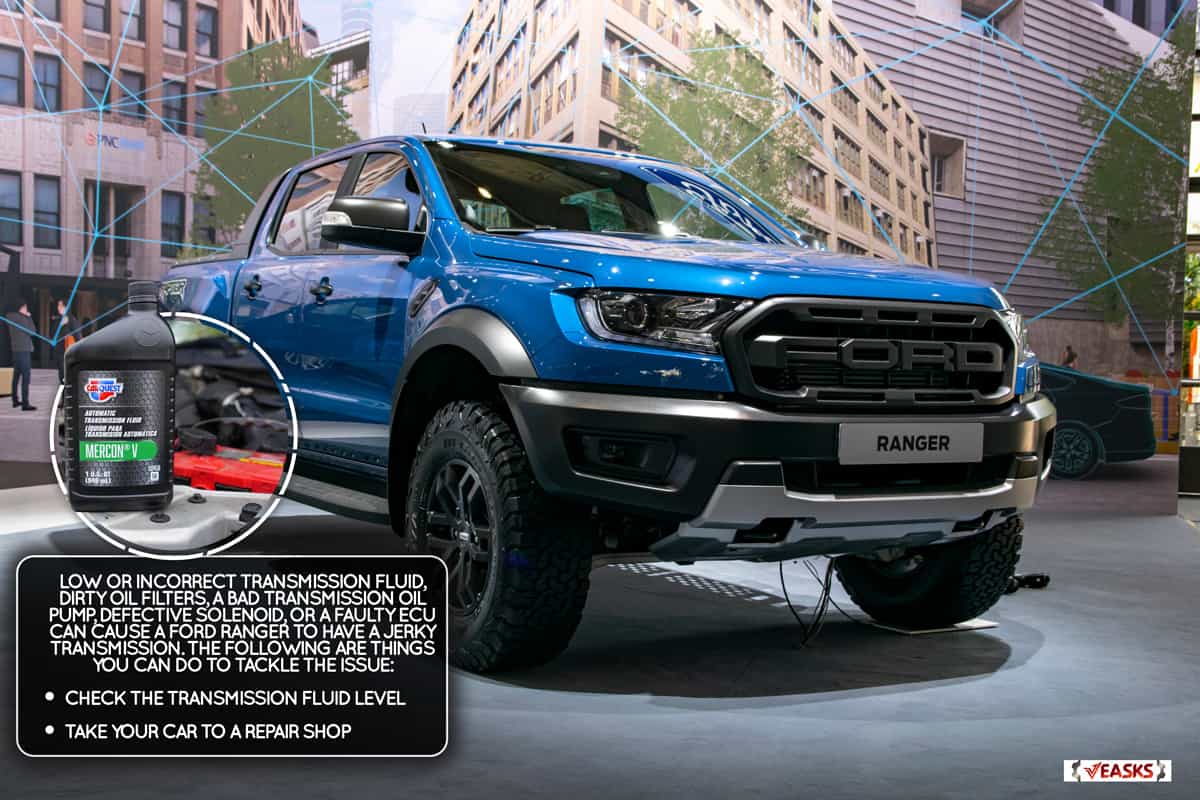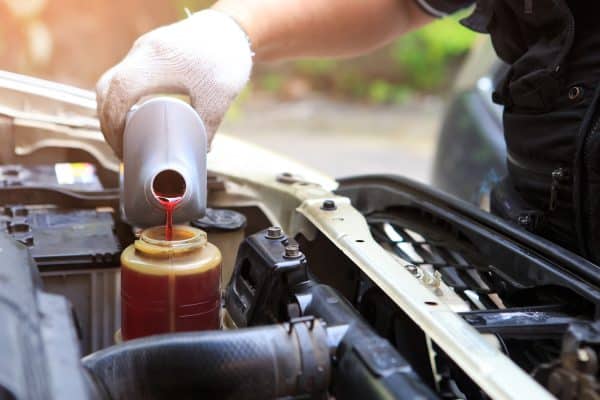If your Ford Ranger has a jerky transmission, you may be wondering the cause of the issue and how to fix it. Fortunately, we have done some research for you, and here is what we found.
Low or incorrect transmission fluid, dirty oil filters, a bad transmission oil pump, defective solenoid, or a faulty ECU can cause a Ford Ranger to have a jerky transmission. The following are things you can do to tackle the issue:
- Check the transmission fluid level
- Take your car to a repair shop
If the transmission on your Ford Ranger starts malfunctioning, solve the issue as soon as possible to avoid further damage. Keep reading to get detailed information on how to deal with a jerky transmission.

Why Does My Ford Ranger Have A Jerky Transmission?

The following are possible reasons why your Ford Ranger has a jerky transmission:
Low Transmission Fluid
When your vehicle's transmission fluid level is low, it may not be able to generate as much hydraulic pressure as is needed for proper operation.
When this happens, you may observe that your vehicle's engine speed increases while moving slowly. One of the most common side effects of this transmission problem is that the system starts to jerk.
Click here to view this transmission fluid on Amazon.
Incorrect Automatic Transmission Fluid
It is essential to use a fluid of specific viscosity and with the performance characteristics stated by the car's handbook to meet the transmission fluid criteria imposed by the manufacturer.
If you use incorrect oil, it may be more or less dense than needed, preventing it from ensuring the regular operation of the automatic transmission. As a result, your Ford Ranger and the automatic transmission will jerk due to the wrong characteristics of the fluid used.
Dirty Oil Filters
Oil filters protect the vehicle against pollutants such as dirt, debris, and other substances that could taint the engine when injected from the oil. However, over time, these filters accumulate dirt and buildups that can impede their performance, causing the transmission to jerk. This can also lead to incomplete combustion.
It is essential to keep an eye on the transmission fluid filter's state and use high-quality fluid with the appropriate parameters that the manufacturer has given. Rremember to replace both the filter and the fluid at the proper time.
Click here to view this oil filter on Amazon.
Bad Transmission Oil Pump
Oil pump failures are rare because of their reliable design. Nonetheless, it may fail if it sustains mechanical damage or if there is a defect in the manufacturing process.
Under these circumstances, the transmission fluid will stop circulating at the operational pressure it was designed for. The pressure reduces, resulting in jerky gear changes and a complete transmission breakdown in the worst-case scenario.
Defective Solenoid
Transmission fluid is controlled in the hydraulic plate channels by solenoids, which are timed valves that open and close.
However, solenoids can break down due to age or mechanical damage. As a result, the solenoids won't do their jobs properly, and the entire transmission will become jerky when shifting gears since the channel doesn't close or open.
The material solenoids are produced from makes matters worse. Automobile solenoids are typically plastic components. Therefore, they can melt at high temperatures, losing their shape and rendering them useless.
Faulty ECU
Transmission Jerks may result from a malfunctioning electronic control unit (ECU). A software error can trigger this. In this scenario, the automobile jerks when the driver changes gears and may experience other breakdowns.
The engine speed won't be stable, and the automatic transmission won't react when you change gears. In this particular circumstance, conducting computer diagnostics on the ECU is essential.
What To Do If My Ford Ranger Has A Jerky Transmission?

Here is what to do if the transmission on your Ford Ranger starts jerking:
Check The Transmission Fluid Level
When diagnosing a problem, one of the oldest pieces of advice is to begin with the solution that requires the fewest steps and little money.
In this instance, you should begin by checking the amount of the transmission fluid. When there is not enough fluid in the transmission, it can cause it to jerk.
It is essential to determine the cause of the low fluid level and address any underlying issues. There may be a problem with the seal or another mechanical flaw. If you don't address the causes of the low fluid, adding more fluid will not eventually solve the issue.
Take Your Car To A Repair Shop
If you've checked the transmission fluid levels and couldn't locate the problem, take your vehicle to a repair shop so that professionals can investigate other issues.
Your transmission's air filter, gears, and oil pump may be all worn out or clogged. If that's not the case, the solenoid may not get enough fluid into the transmission. As a result, shifting through the gears may become more problematic than it usually would.
How Long Do Ford Ranger Transmissions Last?
On average, an automatic transmission will last between 80,000 and 150,000 miles, but manual transmissions may fail sooner than that, especially if they aren't properly maintained regularly.
The Ford Ranger's transmission can last for about 200,000 to 300,000 miles or more with the right amount of care. This includes changing the fluid in the transmission system regularly and regular examinations.
However, if you do not conduct routine maintenance, you risk having difficulties with your transmission at the 100,000-mile mark or even sooner.
How Much Will I Spend To Repair A Ford Ranger Transmission?

Simply put, you will need to replace components that have failed with a new version of those components, especially if the transmission is in such bad shape that it is impossible even to consider repairing it.
Depending on the model of the Ford Ranger, where you live, and other factors, the cost of fixing or replacing your transmission will be between $2,049 to $3,500.
Transmission services, such as changing the fluid in the transmission or flushing the transmission fluid, are far more affordable; sometimes, they cost less than $150.
How Do I Check If My Ford Ranger Transmission Is Bad?
You can do the following to determine if your Ford Ranger transmission is faulty:
Check The Warning Lights
The check engine light usually turns on if there is a problem with the transmission on your Ford Ranger. If your car's dashboard displays warning lights, it may be time to visit a mechanic for a transmission check or other repairs.
Examine The Transmission Fluid
To further test the transmission, you can examine the transmission fluid in your vehicle. Start your car and place it in park if you want to examine the fluid.
You need to open the hood and remove the dipstick to check the transmission fluid. Test and verify the fluid level in the transmission and inspect the fluid for any discoloration.
Rev The Automobile
Another way to test for transmission issues is to rev the engine. Don't rev the automobile for more than a few seconds; keep the parking brake on when doing this. If the engine doesn't rev or stays revved, it shows a transmission problem.
How Long Can I Drive On A Bad Transmission?

It is never a good idea to drive for long with a faulty transmission. You can still drive the vehicle, but you are putting it in danger every time. If you suspect your transmission is malfunctioning, you should take it to a repair shop as soon as possible.
If your vehicle has a malfunctioning transmission, it is only a matter of time before you cannot move it at all. At that point, the damage will be considerably more extensive and costly to fix.
To Wrap Up
If you've noticed that your Ford Ranger has a jerky transmission, the problem could be caused by low transmission fluid, dirty oil filters, bad transmission oil pumps, defective solenoids, and/or a faulty ECU. Don't hesitate to take your car to a professional if you can't deal with the problem alone.
If you enjoyed reading this post, here are similar articles you may like:
Does My Truck Have A Transmission Cooler?





